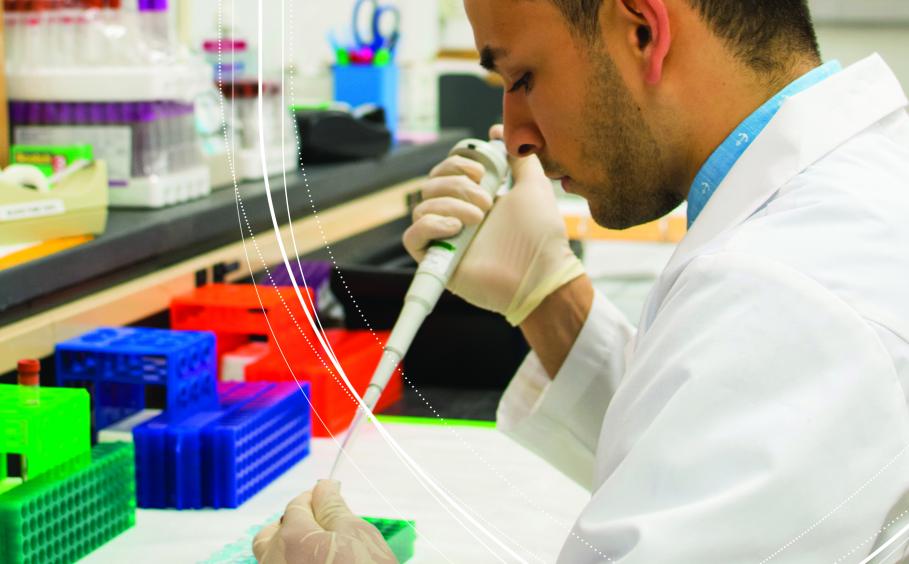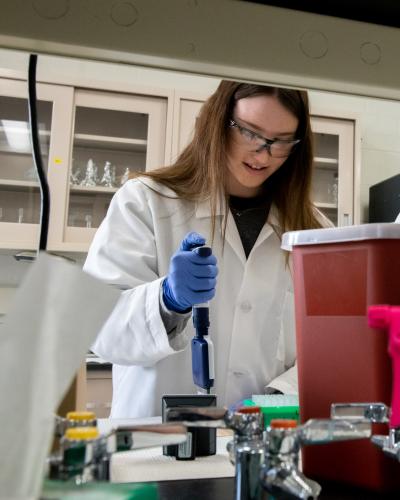Research & Fellowships

Undergraduate Research
Penn State is know world-wide for its reserach endeavors. HHD students have the unique opportunity to contribute to the development of new knowledge that directly impacts the human experience. Whether your interests lie in healthcare, education, business, law, recreation, hospitality, and beyond, you're sure to find an area to research.

Want to learn more about what HHD students are researching? Explore their profiles now!
Getting Started in Research
Review the tips below to begin your research journey.
- Why & When Students Get Involved in Research
-
Why Get Involved in Research
Research enriches the educational experience by granting unique opportunities to be intellectually challenged in a supportive space.
Students engaged in research will:
- Meet new people with similar interests
- Receive direct and individualized mentorship from experts such as graduate students, post-doctoral researchers, and faculty members
- Clarify professional goals (It is totally okay if you decide a future in research is not for you!)
- Develop the top skills employers and graduate schools look for (e.g., problem solving, critical thinking, effective communication, etc.)
- Potentially increase their chances of earning funding for graduate school
When To Get Involved in Research
There is no “right” time in your undergraduate career to get involved with research. Once you feel adjusted to the expectations and demands of college, you can dive in. Your research experience might look different depending on the amount of time you have left at Penn State.
First- and Second-Year Students
Starting early in your undergraduate career...
- Provides time to understand a research topic, refine your interests, and change topics if necessary
- Allows students to take on increased responsibilities over time
- Can lead to strong letters of recommendation or references from faculty mentors
Third- and Fourth-Year Students
- Prior undergraduate coursework may help students identify a research question of interest and aid in identifying a research mentor
- Research at this stage may help students complete a thesis or other graduation requirement
- Consider the Types of Research Opportunities Available
-
Your participation in undergraduate research could take any of the following forms:
For Course Credit:
Meet your academic adviser to discuss academic credit for research. Most departments are able to offer 400-level credit for independent study or research specific endeavors, but be sure to confirm your plans with you academic adviser to ensure these credits will fit with your academic plan and professional goals.
For Pay:
If a faculty member or department has funding available (internal or external), you might be able to be paid for your work. Or, if you have received a federal work-study (FWS) award, tell your mentor! Your mentor can work with the undergraduate research office so that you earn work-study wages for your work on a research project or team.
Through Grant Funding:
There may be grants available that can support the costs associated with your research
- College of Health and Human Development Undergraduate Research Grants
- Erickson Discovery Grant
- Student Engagement Network Grants
- NASA Pennsylvania Space Grant Consortium Research Internship Program
Individual departments, colleges, and campuses may also have grant funding available.
Volunteer:
If earning course credit is not as important to you and being paid is not an option, you can gain research experience by volunteering for a project or team. Be sure to include your participation on your resume.
- Finding Support for Research Goals
-
If you don't know where to begin, we encourage you to meet with HHD's Engaged Learning Specialist and your assigned academic adviser to discuss your interests.
Meet with Undergraduate Research and Fellowships Mentoring (URFM) to discuss getting involved and the general research process at Penn State.
- Finding a Research Opportunity
-
It's important to identify your interests to narrow in on the most appropriate reserach labs and faculty to reach out to. Think about the classes you enjoy and the faculty you get along with. What topics do you enjoy learning about the most? What are you curious about?
Students are also encouraged to explore existing research opportunities in HHD. Each HHD department conducts research, and HHD houses five formal research centers. Also review the PURE Research Database and URFM Undergraduate Research Database for other potential opportunities.
Pay attention to the #HHDStudentInfo weekly newsletter and your department's newsletter for new opportunities.
- Identifying a Potential Research Mentor
-
A research mentor is often a faculty member, like a professor or librarian, but can also be a graduate student or post-doctoral researcher, particularly if you join a research opportunity and are assigned or choose to work on a project they are leading. A mentor’s responsibility is to provide you with training so that you can hone your intellectual curiosity and develop into an independent researcher.
Students do not need to complete research in the department of their declared major. Certainly, this academic unit may most closely align with your profesional and post-graduation goals, but there are many interdisciplinary projects conducted at the university. Gaining experiencing working with faculty in different domains can be just as valuable as engaging with those in your department.
It is a good idea to talk with your professors and teaching assistants about any research that they have in progress. Reach out to the appropriate faculty, lab, or research center.
- Tips for Contacting Faculty
-
In order to have the highest chance of success, you will likely need to reach out to multiple faculty members.
Once you have identified a potential mentor, spend time learning about their reseearch by reviewing the website, searching for that individual on PSU News, and/or reading artciles that individual has published. This will help you be genuine and informed when doing outreach.
Written communication is always best. If you chat with a faculty member in class, be sure to follow up via email.
Do:
- Address the individual you are emailing by name (e.g., Dr. Smith, Professor Smith, Ms./Mr. Smith, etc.)
- Tell the individual about yourself (e.g., name, major, year of study, etc.)
- Explain why you are interested in research (and their specific research!) based on what you previously learned about their work
- Offer a few times to schedule a meeting to discuss your interests and potential ways you can contribute to their work
- Follow up - remember that faculty are busy, so they may not respond within 24-48 hours, but if you do not hear back within a week, feel free to send a follow up email
Don't:
- Send generic emails; make sure everye mail you send is personalized to the individual/lab that you are reaching out to
- Forget to proofread; research requires attention to detail, and having typos or grammatical errors in your emails may give off the wrong impression about your skills
- Give up; you may not be successful right away, but keep trying and feel free to ask faculty who have turned you down for suggesions on others to contact based on your interests
Drafting Your Email:
To: Faculty's Penn State email address
Subject: Research Lab Inquiry
Body:
- Salutation: e.g., "Hello Dr. Smith," or "Good Morning Professor Smith," etc.
- Paragraph 1: Introduce yourself. Tell the faculty member that you are interested in learning more about research broadly and their research specifically. If you know the faculty member, explain how (i.e., "I am a student in your KINES 202 class this semester.")
- Paragraph 2: State why you are interseted in research. What are your goals? What are your career interestes and how do they relate to research? How will conducting research help you meet your goals? Indicate that you have read about their esearch and express interest. Talk about what you hope to learn from working in this lab/with this faculty member as it relates to your interests and goals.
- Paragraph 3: Close by asking if the faculty member would be willing to meet with you to discuss their research and how to get involved in research in general. Offer a few time blocks that work with your schedule
- Signatute: Be sure to end the email with a complinemtary close and your name on the line below it (e.g., "Sincerely," "Thank you," etc.)
- Enroll in Research-Based Coursework
-
Consider enrolling in classes that teach relevant research skills. Courses that cover statistics or research methods may provide some good background knowledge to succeed in research. Talk to your academic adviser for more information.
- Some Items to Keep in Mind
-
Students may conduct research individually or as part of a lab. Students can design their own research projects on a topic of particular interest to them or review the existing opportunities available to them in HHD and at Penn State. Either way, you will need to find a faculty mentor to support your growth and development in this area while you complete your research experience.
Some research labs require a formal application. Each faculty member has a different process for how they run their lab. Some require a formal application and interview process, while others simply require an email indicating interest in the program. It is also possible that faculty members identify you as a strong student in their class and reach out to you to be a research assistant.
There is no "one way" to do research. Research can be qualitative, quantitative, or a mixture of both. There no "right" way for a research study to be conducted. The best approach is decided based on the subject of the research and the main research question(s) you are trying to answer. A faculty mentor can help you decide on the more appropriate method of inquiry.
Fellowships
Fellowships are opportunities that fund professional and/or educational experiences. The Undergraduate Research and Fellowships Mentoring (URFM) office is designed to help students navigate the fellowship application process.
Possible education-related experiences include paid research opportunities, overseas language-learning experiences, and travel to non-traditional locations. Although some fellowships are for tuition only, most of the fellowships that URFM coordinate include a specific experience and range in duration from three weeks to one year or more. Profession-related experiences include teaching and internship placements and are often closer to one year in duration.
Spark Program
The Spark Program offers select first- and second-year undergraduate students the opportunity to learn about high-impact educational experiences, campus resources, and fellowship opportunities. This program also provides participants with the tools to develop competitive fellowship applications.
